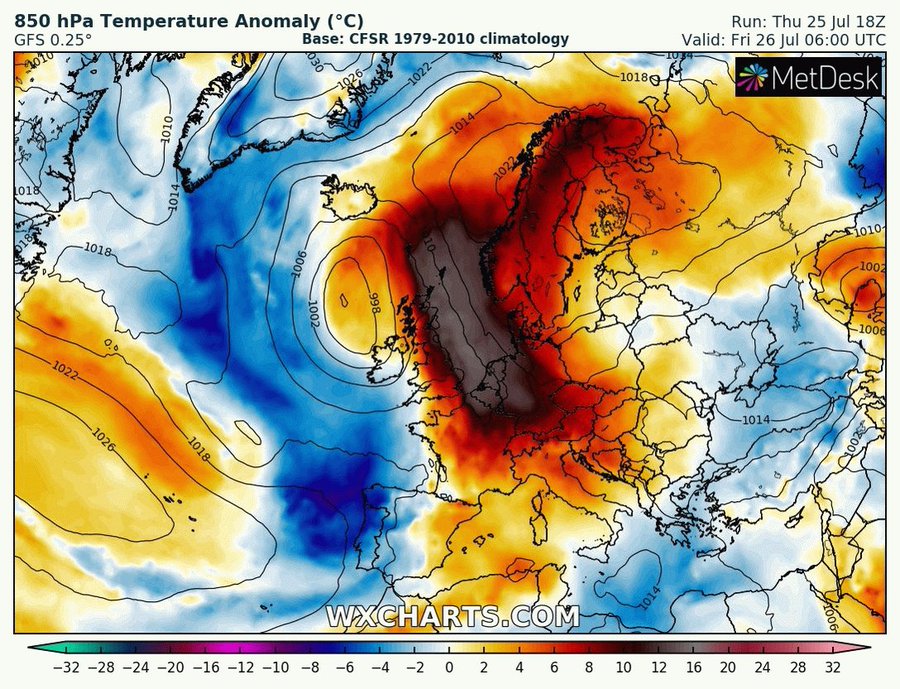![Europe heatwave could 'enhance melting of Greenland ice sheet' WMO said increasingly frequent and intense heatwaves were linked to man-made climate change [File: Lucas Jackson/Reuters]](https://www.aljazeera.com/mritems/imagecache/mbdxxlarge/mritems/Images/2019/7/26/e7982d2080004dd5a7312e0ea9a8e95f_18.jpg)
The United Nations weather agency has voiced "concern" that hot air producing a record-breaking heatwave across much of Western Europe is headed towards Greenland and that it could lead to a faster ice melt.
Heat records in France, Belgium, the Netherlands and Germany tumbled in recent days as hot air surged northwards from North Africa and Spain, sending the mercury soaring upwards of 40C.
World Meteorological Organization (WMO) spokesperson Clare Nullis said in the Swiss city of Geneva on Friday that forecasts suggest the air is heading towards Greenland.
This would result in "high temperatures and consequently enhanced melting of the Greenland ice sheet", Nullis said.
Ice has been melting at high levels over the last few weeks in Greenland, according to WMO.
Nullis cited data from Denmark's Polar Portal, which measures the daily gains and losses in surface mass of the Greenland ice sheet.
What happens next to the extreme #europeheatwave? Actually, the atmospheric flow will transport the heat towards #Greenland, resulting in high temperatures, consequently enhanced melting and a negative #SMB (surface mass balance) next week. Make sure to watch the @PolarPortal!
283 people are talking about this
"In July alone, it lost 160 billion tonnes of ice through surface melting. That's roughly the equivalent of 64 million Olympic-sized swimming pools. Just in July. Just surface melt - it's not including ocean melt as well," Nullis said.
The Greenland Ice Sheet covers 80 percent of the island and has developed over many thousands of years, with layers of snow compressed into ice.
The dome of ice rises to a height of 3,000 metres and the total volume of the ice sheet is approximately 2.9 million cubic kilometres, which would raise global sea levels by seven metres if it melted entirely, according to the Polar Portal website.
'Records smashed'
Nullis also said increasingly frequent and intense heatwaves were linked to man-made climate change.
"What we saw with this one was that temperature records weren't just broken, they were smashed," she added, citing a study by Britain's Met Office which found that by 2050, record-breaking heatwaves would happen every other year.
Among the areas enduring record-breaking heat on Thursday was Paris, which recorded its hottest day ever with 42.6C - the French capital's previous record of 40.4C was set in July 1947.
In Germany, meanwhile, the northwestern town of Lingen recorded the country's highest temperature ever, at 42.6C, according to the German Weather Service.
Belgium also saw temperatures rise above 40C, with a new record of 40.6C, the hottest day since the country started keeping records in 1833.
The country's first death as a direct result of the record-breaking heatwave was also confirmed on Thursday when a woman was found dead near her caravan close to the beach.
The 66-year-old was found by a neighbour in Middelkerke, on the Belgian coast, after she had apparently been basking in the blazing sun.
Simmering just below 40C, meanwhile, the Met Office said the UK on Thursday experienced its hottest July day and second hottest day on record, with temperatures topping out at 38.1C in Cambridge.
SOURCE: AL JAZEERA AND NEWS AGENCIES


沒有留言:
張貼留言